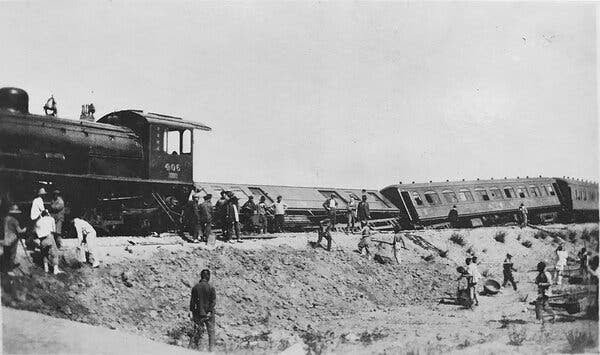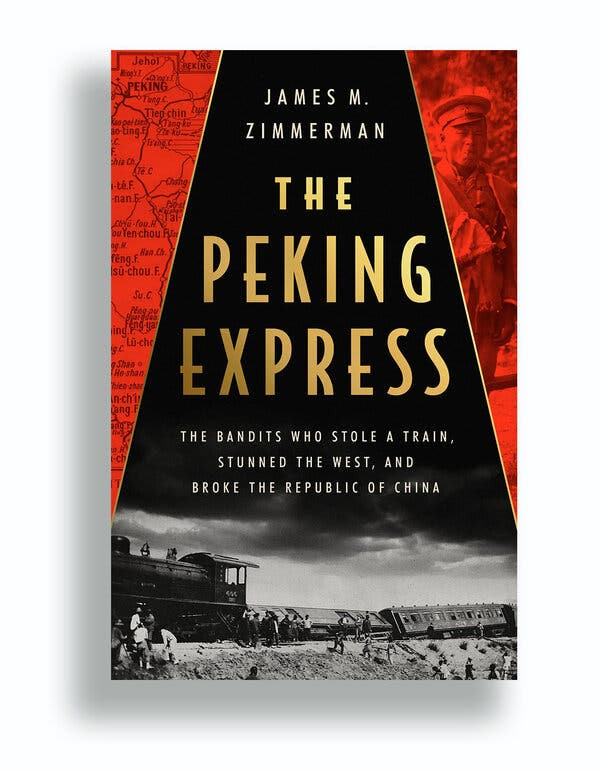The Great Train Robbery on the Shanghai-to-Peking Express
A century ago, justice-seeking bandits derailed a train in rural China and took dozens of hostages, a story unspooled by James M. Zimmerman in “The Peking Express.”


THE PEKING EXPRESS: The Bandits Who Stole a Train, Stunned the West, and Broke the Republic of China, by James M. Zimmerman
Spare a thought for bandits — social bandits, that is, not common robbers, dacoits, badmashes, brigands or gangsters snarling, “Leave the gun, take the cannoli.”
Social bandits are, rather, peasant heroes of popular resistance, cheated of their livelihood, exploited and scorned by landlords and power brokers, the nascent revolutionaries who seek justice in the asymmetrical warfare of class struggle. They are known all over the world, from the early “Haiduks” of the Balkans to Robin Hood, Pancho Villa and Sun Mei-yao, the leader of the horde which attacked the Peking Express one night in 1923, the subject of James M. Zimmerman’s excellent new book.
Though “The Peking Express” describes in exhaustive and dramatic detail the derailing of this train, in rural China, by just such desperate and resourceful men, neither in the text or extensive bibliography does Zimmerman allude to “Bandits,” by the great Marxist historian Eric Hobsbawm. However, this book reads like an extensive and enlightening footnote to that study of the people whom Hobsbawm describes as “peasant outlaws whom the lord and state regard as criminals, but who remain within peasant society, and are considered by their people as heroes, as champions, avengers, fighters for justice, perhaps even leaders of liberation and in any case men to be admired and supported.”

Such banditry was an ancient tradition in China, recounted in the 15th-century novel “Shuihu zhuan” (“Water Margin”) and enduring into the modern warlord era. The province of Shantung (Zimmerman uses the Wade-Giles system of Romanized transliteration, as was the custom in 1923), where the train was attacked, was dominated by warlords and foreign investors and consequently thick with peasants deprived of justice. The instigator of what became a suspenseful global story, 25-year-old Sun Mei-yao was a former soldier who sought back pay for his men, reinstatement in the army, and — ultimately — the overthrow of the Chinese government. His plan was to derail the train, kidnap as many passengers as possible, keep them as hostages and bargain for their release.
Compare this ambitious, sinister yet somehow high-minded scheme to the complacency of the mostly European and American first-class passengers on the train from Shanghai to Peking, delighting in luxurious sleeping cars and excellent meals. Among them was John D. Rockefeller’s sister-in-law, the heiress Lucy Aldrich; the distinguished publisher John B. Powell; various U.S. Army officers; a Fascist Italian diplomat; and a number of men from Shanghai’s Jewish community — a stockbroker, a jockey, a playboy and at least one criminal, Joseph Rothman. The other carriages were crammed with hundreds of poor Chinese traveling hard class.
The initial plan was a success. The derailment took place at Lincheng, which gave the heist its historical name, “the Lincheng Incident” — the inspiration for the 1932 film “Shanghai Express.” But the film was mostly Hollywood baloney; Marlene Dietrich and her co-stars never knew the horrors and hardships described by Zimmerman. Rothman was fatally shot, along with the many Chinese who resisted, and the surviving hostages — most of them in pajamas — were force-marched for miles up rocky terrain to a rough camp, while at the same time a local warlord, who had been alerted to the incident, began to lay siege to the kidnappers.
One of the salutary features of this book is Zimmerman’s use of quoted speech, all of it sourced from memoirs and newspaper reports, so the human voice is heard often and to good effect. The kidnappers had more hostages than they had bargained for — 100, including 28 foreigners — and there was not nearly enough food. Some supplies were hastily arranged and sent up the mountain, causing Leon Friedman to remark, “What is a good Jew boy going to do in the circumstances? We starve and they send us a ham! We have nothing to read, and they send us the New Testament!” Friedman was happier when he got a shipment of what was described as veal — and he acted as chef, until it was revealed to be dog meat.
Negotiations began, a few ailing hostages were released, messages were carried down the mountain by some of the American children; but the threats from below increased. Sun and his men dragged the hostages higher, to a hide-out at the top of distant Paotzuku Mountain. This ancient redoubt was also a prison, where scores of kidnapped children from wealthy Chinese families were languishing.
Lucy Aldrich, who had fallen behind, found herself in a small village and was rescued. One hardly knows whether to admire or scorn this woman who — at the risk of her life — kept her jewels from the grasp of Sun and his men by first stuffing them into her brassiere and later hiding them in the crevice of a rock. It was an enormous satisfaction to her that, while every other passenger had been fleeced, she was able to retrieve her trove, and she dined out on her kidnapping story, an account of which she published later in the Atlantic Monthly as “A Week-End with Chinese Bandits.”
In all the to-ing and fro-ing, which involved President Harding, the Chinese premier, and French and Italian diplomats, the real hero of the Lincheng Incident was Roy Scott Anderson, political adviser to the Chinese government and a longtime resident, fluent in Mandarin, who was brought from Peking to negotiate the release of the remaining hostages. Due to the gradual release of prisoners, their numbers had now diminished to only eight, but almost a month of captivity had taken its toll. They were still hungry, and Sun had threated to kill them all if negotiations failed. Yet Anderson was persuasive, and in the absence of a guarantee from the Chinese government, he gave his personal assurance that Sun and his men would be compensated and reinstated. After 37 days the hostages were granted their freedom.
Happy for them — but not for Sun Mei-yao, who, much to Anderson’s horror, was captured and summarily beheaded. But Sun had made his point: The Lincheng Incident proved that the Chinese government was incompetent and corrupt. The president was deposed, and ultimately Mao was given a peasant martyr to exalt.
Much as I enjoyed the book, I must take issue with the publisher’s description of it as “brilliantly written.” We regularly find such locutions as, “three days of schlepping across the countryside” and “Musso went ballistic.” The serious subject deserves more felicitous language.
Zimmerman may not be a stylist, but he is a diligent researcher, and as a longtime resident of China, a shrewd observer of its politics. In an ominous epilogue, he writes that the Lincheng Incident should have provided an enduring lesson. And yet, “economic inequality and systematic corruption continue to bedevil the leadership in power, just as in 1923.” He goes on, “China’s contemporary warlords, up and down the government and state-sector hierarchy, continue to plunder the country’s wealth and opportunities at the expense of the powerless.” This would be a great subject for another book, as well as provocation for another social bandit.
Paul Theroux is the author of more than fifty works of fiction and travel. His latest novel is “The Bad Angel Brothers.”
THE PEKING EXPRESS: The Bandits Who Stole a Train, Stunned the West, and Broke the Republic of China | By James M. Zimmerman | Illustrated | 338 pp. | Public Affairs | $30